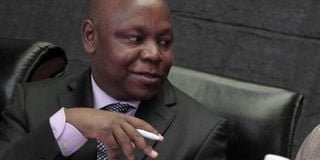Dubai company to know fate of tender award for ballot papers

Paul Gicheru, the chairman of the Public Procurement Administrative Review Board, at Kenyatta International Convention Centre on May 29, 2015. PHOTO | DIANA NGILA | NATION MEDIA GROUP
What you need to know:
Mr Paul Gicheru led the Public Procurement Administrative Review Board in hearing the review appeal that started with the consideration of the applications by the two parties and later the hearing of the actual case.
IEBC lawyer Anthony Lubulellah put up a spirited fight to convince the tribunal that the award of the tender was above board.
Dubai-based firm Al Ghurair, which won a Sh2.5 billion tender to supply materials for next year’s General Election, is set to know the fate of the award tomorrow.
This is after lawyers representing the Independent Electoral and Boundaries Commission and Paarl Media, a South African printer contesting the tender award, finalised their submissions on Friday.
Mr Paul Gicheru led the Public Procurement Administrative Review Board in hearing the review appeal that started with the consideration of the applications by the two parties and later the hearing of the actual case.
“We will consider this matter and give a verdict on Monday at 4.30pm, even if it means working up to midnight,” Mr Gicheru said in reference to the committee’s terms of reference.
IEBC lawyer Anthony Lubulellah put up a spirited fight to convince the tribunal that the award of the tender was above board.
He sought to deflate the argument of Mr Willis Otieno, who represented Paarl Media, that the tender was not processed in accordance with the law nor that the tender specifications and marking scheme used to settle on the winner were arbitrarily skewed to favour a particular company.
Mr Otieno, who accused the electoral agency of failure to clarify issues as required by law, said the process was meant to reduce the entire tender to single sourcing.
Besides, he said, the tender specifications failed to acknowledge that the election laws Act that took effect on October 4, makes technology a key component in election matters.
WAS INCOMPETENT
But in a rejoinder, the IEBC lawyer, in a bid to have the application thrown out, argued that Paarl Media’s application was incompetent as it did not meet the specification of the procurement law as required.
The lawyer termed the process competitive, saying the bidder failed to comply with five of the 10 requirements to win the tender.
Documents that Paarl Media did not submit included lSO certification, a tender security document and audited accounts. The company also failed to provide the requisite number of ballot paper samples for various elective positions, as required.
“Failure to demonstrate compliance with the requirement to deposit 10 per cent of the contract sum renders the application non-compliant with the aforesaid mandatory statutory provision meant to discourage filing of frivolous suits and where the sole intention is to delay the process,” IEBC argues.
Some of the communications, he said, were done by third parties who are strangers to the tender process.
Mr Lubulellah said the election law had not been enacted by the time the tender was closed. Besides, he said, the tender was not for technology equipment for it to be affected by the election law.
“The tender can’t be faulted on the basis of a law that didn’t exist. It is irrelevant on matters of procurement,” Mr Lubulellah said.
He wondered why Paarl Media was the only company aggrieved by the verdict, out of the nine firms that submitted their bids.
Mr Lubulellah said the tender award was guided by the Public Procurement and Assets Disposal Act, which must prevail in the event of any other law.
APPEARED CONCERNED
Mr Gicheru and the board members appeared concerned with revelations that Paarl Media did not comply with the tender requirements. “You client was disqualified at the preliminary evaluation stage for failure to submit the required documents. Confirm if these preliminary requirements were met,” Mr Gicheru asked the applicant’s lawyer.
But the lawyer said they were faulting the failure by the electoral agency to stick to the law. Mr Otieno said IEBC did not clarify issues nor offered the reasons for rejecting their bid.
“We are not challenging the competence of a successful bidder. These proceedings are challenging the process adopted by the procurement entity in arriving at the outcome,” he said.
Siaya Senator James Orengo, who is leading a team of Cord lawyers in the case, called for annulment of the award to pave the way for consultations.
He said that IT integration was key in eliminating fears of vote fraud. “We are keen on ensuring that IT integration is in place; so that we can have an election that is easily verifiable, free and fair,” he said.
Cord and Jubilee were enjoined in the application on condition that their arguments would be restricted to procurement issues only.
The South African firm argues that the ballot papers required ICT integration to enable systemised artwork generation.




